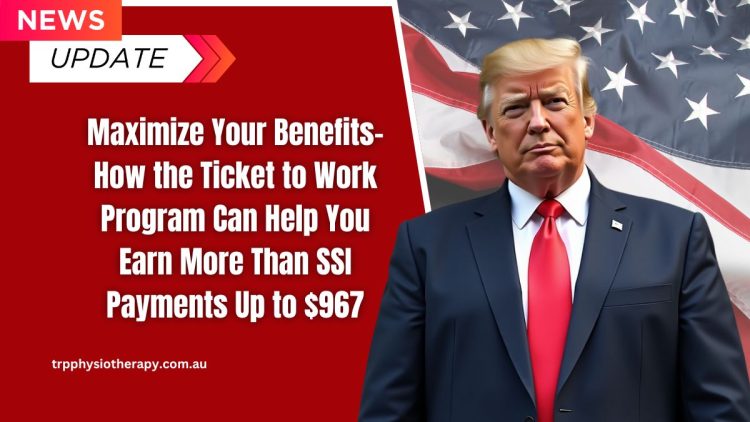The Supplemental Security Income (SSI) program provides financial assistance to individuals who are disabled, blind, or 65 years old or older.
It is designed for low-income individuals, offering monthly payments to help those in need, particularly when they are unable to work due to health conditions.
Below, we explore how SSI works, its eligibility requirements, and how recipients can take advantage of work incentives and programs like the Ticket to Work to achieve financial independence.
What is the SSI Program?
The SSI program offers a monthly benefit to qualifying individuals who meet specific criteria.
The program is meant to provide financial support to people who are unable to support themselves due to a disability, blindness, or old age (65 or older).
Since it is a low-income program, there are strict income and resource requirements that must be met to qualify for benefits.
SSI Payment Amounts
For those who qualify for SSI benefits, the program offers the following:
- Married couples can receive up to $1,450 per month if both partners qualify for the benefit.
- Individuals can receive up to $967 per month.
- If you qualify as an essential person (someone who provides care to a person receiving SSI), the amount you receive will be lower.
These benefits can be vital for those who can no longer work due to medical conditions or disabilities and struggle to make ends meet.
SSI and the Ticket to Work Program
What is the Ticket to Work Program?
One of the valuable services offered to SSI recipients is the Ticket to Work Program, which aims to help people with disabilities become financially independent by assisting them in finding employment.
The Ticket to Work program allows SSI recipients to pursue career development without risking the loss of their benefits.
However, this program is only available to individuals between the ages of 18 and 64. It’s important to note that participation in the program is voluntary and free of charge.
The Social Security Administration (SSA) will not force anyone to join; instead, it provides this as an option for those who want to take steps toward reentering the workforce.
How Does the Ticket to Work Program Help?
The Ticket to Work program can significantly help individuals with disabilities who are eager to find a job or improve their career prospects.
For example, the program has been particularly beneficial for individuals like Adrienne, a woman with Autism Spectrum Disorder (ASD), who found full-time employment as a Departmental Aide in Philadelphia after participating in the program and completing Project Search.
Her success story serves as inspiration for other SSI recipients with disabilities to take part in the program.
Work Incentives for SSI Disability Recipients
In addition to the Ticket to Work Program, the Social Security Administration offers several work incentives that can assist SSI recipients in transitioning from disability benefits to financial independence.
These work incentives are meant to encourage people to return to work without fear of immediately losing their benefits.
Key Work Incentives for SSI Recipients
Here are some of the most common work incentives available to individuals receiving SSI disability benefits:
| Work Incentive | Description |
|---|---|
| Continued Benefit Payments While Working | You can continue to receive your SSI benefits even if you begin working. |
| Medicaid & Medicare Coverage | You may retain your health coverage while working. |
| Expedited Reinstatement of Benefits | If your work performance drops due to medical conditions, your benefits can be reinstated quickly within five years. |
| Impairment-Related Work Expenses (IRWE) | Excludes certain work-related expenses related to your disability. |
Expedited Reinstatement: A Lifeline for SSI Recipients
The expedited reinstatement program is a powerful work incentive.
If you are unable to continue working at the Substantial Gainful Activity (SGA) level due to your medical condition, this benefit ensures that you don’t have to worry about starting a new disability application.
You can request benefit reinstatement within five years of your payments stopping, simplifying the process and relieving stress.
How the Ticket to Work Program Supports Career Development
A Success Story: Adrienne’s Journey
The Ticket to Work program has led to many success stories, such as that of Adrienne, a young woman diagnosed with Autism Spectrum Disorder (ASD).
After joining the program and completing Project Search, she secured a full-time position as a Departmental Aide with the City of Philadelphia.
Her story is a prime example of how the Ticket to Work Program can empower individuals with disabilities to achieve career goals and gain financial independence.
The SSI program provides essential financial support for individuals with disabilities, the elderly, and the blind. Through programs like the Ticket to Work, recipients have the opportunity to pursue employment and become financially independent.
By taking advantage of various work incentives and career development programs, SSI recipients can achieve their employment goals while continuing to receive essential benefits. If you are receiving SSI benefits, consider exploring these opportunities to improve your financial well-being and career prospects.
FAQs
What is the maximum SSI benefit for an individual?
The maximum SSI payment for an individual is $967 per month, but it can be higher if both a married couple qualifies.
Can I continue to receive SSI while working?
Yes, you can continue receiving SSI benefits while working, depending on your income and work hours. The Ticket to Work program can help you transition to work without losing your benefits immediately.
What is the Ticket to Work program?
The Ticket to Work program is a voluntary program that supports individuals with disabilities in finding and maintaining employment. It is available to SSI recipients aged 18 to 64 and is designed to help people transition to financial independence.
How long can I receive SSI benefits if I start working?
You can continue receiving SSI benefits as long as your income does not exceed the Substantial Gainful Activity (SGA) limit. If you are unable to work at the SGA level, you may qualify for expedited reinstatement.

